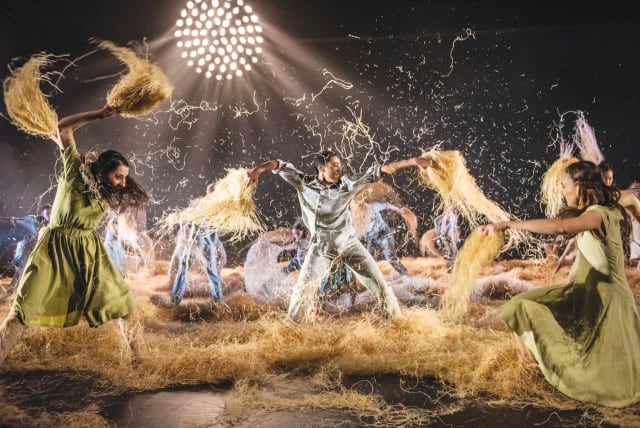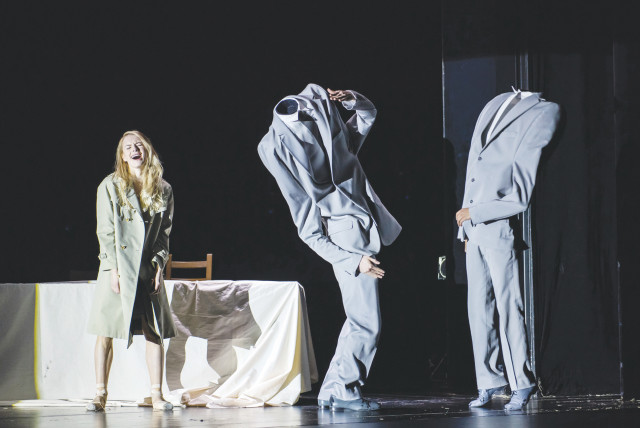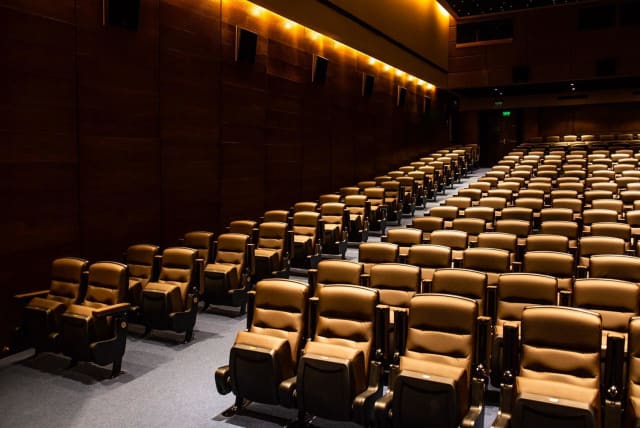After their successful visit here with Cacti – Rite of Spring, the Dortmund Ballet returns with Alexander Ekman’s breathtaking work, Midsummer Night’s Dream, at the Israeli Opera.
One of the most exciting ballet companies in Europe today, the Dortmund Opera Ballet, founded in 1904, has reached new professional heights since Chinese choreographer Xin Peng Wan became the company’s artistic manager.
Ekman’s Midsummer Night’s Dream has very little to do with the famous play by Shakespeare. The powerful, contemporary piece explores the energy and the mysteries conjured up, in the Scandinavian tradition, by the summer solstice.
Not much ado about Shakespeare
It is the height of summer, the longest day of the year, and everyone gets together to celebrate the age-old traditions of midsummer. Anyone who spent the special day in Sweden knows how important keeping tradition is for everyone, including wearing traditional clothes and dancing around the maypole. The Swedish summer is short, everything must bloom at once, nature gushes with vitality, and the shortest night of the year is filled with romance and eroticism.
Ekman once again shows his talent for creating unforgettable dance-theater productions, with 40 virtuoso dancers, a hunting musical score written by Swedish composer Mikael Karlsson and played live on stage, Swedish star pop singer Anna von Hausswolff singing live through the production, and adding magic with her angelic voice, and an enchanted stage set.
“When the manager of the Swedish Royal Opera called me and suggested that I do a work based on Midsummer Night’s Dream, I was not so enthusiastic at first,” Ekman confesses in a conversation after the performance in Dortmund. “The idea felt dusty and old.”
Then the Swedish choreographer had a second thought. “In Sweden, we have a tradition of midsummer celebrations. I know it so well and it clicked. I grew up with these celebrations.
“It is a big thing in Sweden, because we have so much darkness during the winter. So when summer finally comes, it is an interesting time. If it rains, everyone is disappointed, but when the sun is out and the weather is good, it is glorious. No one understands the happiness we feel when the light comes back. We experience this joy together, in the community. It is special,” he recalls.
THE CURTAIN rises and we see the dreamer awakening. A second curtain rises to reveal the stage filled with hay. The dancers are lying in the hay – they dance in between the stacks, roll in the hay, and toss hay in the air. The stage becomes golden, the scorching sun hangs above and the festivities commence, complete with eating, drinking, dancing and romancing. Gradually, the party becomes wilder.
“The vibe of lust and the love, and maybe social awkwardness, are maybe a little similar to what happens in Shakespeare’s Dream,” Ekman says. “But apart from that, it is really about the Swedish midsummer. I find us, the Swedish, funny,” he continues. “I think the work places a mirror to society, asking, ‘What is this thing, this celebration?’”
The line between the world of mortals and the kingdom of the supernatural becomes thinner and thinner as night progresses; the world changes and suddenly we are no longer sure – is it all a dream?
The second act finds the dreamer experiencing a lucid scenario of surreal horrors. The change of scenery is dramatic. The golden light of the dream becomes dark and nightmarish. There are mythical creatures – both funny and scary, with headless men and falling fish among other supernatural phenomena. You immediately understand what is going on, even if you are not familiar with ancient Scandinavian mythology.
“The best stuff comes up when we play,” says Ekman, referring to the process with which he and Karlsson employed while working on the production. “I love it when you understand things without the need to explain. Everyone feels, or understands the story.
“There are scenes, or situations on stage, and each has a little rhythmic story going on. I work a lot with repetition. I present a situation, and when the spectators understand it, I move to the next one. For me, the best thing is to feel the connection; when everybody feels the connection.”
Ekman uses humor a lot and he says he loves it when the audience laughs during his works. “I am fascinated by the reactions I get in different places. I found that often in my productions people laugh. I do not create thinking about it, but I guess when people recognize situations and identify with them, they react.”
Ekman says that his Dream is almost like a Broadway show. “But then everything becomes strange,” he says with a laugh. “For me, the work is never done. I am willing to continue working again and again.”
Ekman marvels at his friend’s music. “Karlsson and I worked together on the score. It is very personal for him and for me, and I think it is one of his best works.”
Besides everything else, what really sets this production apart is the seamless fusion of classical ballet and contemporary choreography that Ekman makes seem natural. The dancers of the Dortmund Ballet perform with perfection; they are accurate and virtuosic, yet free, humorous and very seductive.
They really seem to enjoy the show, as do the lucky people who managed to secure a ticket. Ekman takes us by the hand and invites us to enter his private world of dreams, unfolding before our eyes to the beautiful sounds of Karlsson’s music. Do not miss Alexander Ekman’s poetic dream, it is a masterpiece.
Midsummer Night’s Dream, Ballet Dortmund, Germany, May 31-June 3, Israeli Opera, Tel Aviv. For details and tickets, call (03) 692-7777. www.israel-opera.co.il.








































































































